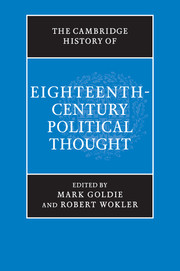Book contents
- Frontmatter
- Introduction
- Part I The ancien régime and its critics
- 1 The spirit of nations
- 2 The English system of liberty
- 3 Scepticism, priestcraft, and toleration
- 4 Piety and politics in the century of lights
- Part II The new light of reason
- Part III Natural jurisprudence and the science of legislation
- Part IV Commerce, luxury, and political economy
- Part V The promotion of public happiness
- Part VI The Enlightenment and revolution
- Biographies
- Bibliography
- Index
- References
3 - Scepticism, priestcraft, and toleration
from Part I - The ancien régime and its critics
Published online by Cambridge University Press: 28 March 2008
- Frontmatter
- Introduction
- Part I The ancien régime and its critics
- 1 The spirit of nations
- 2 The English system of liberty
- 3 Scepticism, priestcraft, and toleration
- 4 Piety and politics in the century of lights
- Part II The new light of reason
- Part III Natural jurisprudence and the science of legislation
- Part IV Commerce, luxury, and political economy
- Part V The promotion of public happiness
- Part VI The Enlightenment and revolution
- Biographies
- Bibliography
- Index
- References
Summary
Scepticism, Judaism, and the natural history of religion
Philosophical scepticism, the questioning of the adequacy of evidence to justify any view or belief, and the questioning of the criteria for deciding intellectual issues in any domain whatsoever, reached its high point in modern philosophy during the eighteenth century. At the beginning of the century the complete edition of Pierre Bayle’s Dictionnaire historique et critique (1702) appeared, raising sceptical problems about matters in philosophy, theology, science, and history, and providing what Voltaire called ‘the arsenal of the Enlightenment’. Bishop Pierre Daniel Huet’s Traité philosophique de la faiblesse de l’esprit humain(Treatise on the Weakness of the Human Mind), a forceful presentation of Pyrrhonism, written at the end of the seventeenth century but published posthumously in 1723, became a sensation (Popkin 1993, p. 139). The Traité appeared twice in English, and in Italian, Latin, and German in short order. In 1718 the most scholarly edition of the writing of Sextus Empiricus was published by J. A. Fabricius, with the Greek text and Latin translations. This was soon followed by two printings of a French translation of Sextus’s Hypotyposes (Outlines of Pyrrhonism), and David Hume carried the sceptical analysis of human reasoning to its highest point in his Treatise of Human Nature (1739–40). A mitigated form of scepticism was developed by many French Enlightenment thinkers, culminating in the radical scepticism of Jean-Pierre Brissot and Condorcet in the last quarter of the century.
- Type
- Chapter
- Information
- Publisher: Cambridge University PressPrint publication year: 2006



